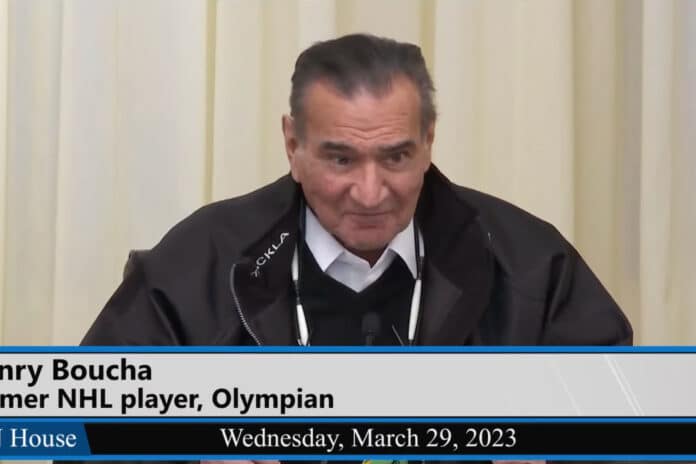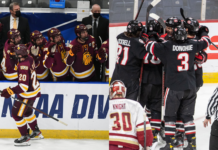
For those who know their Minnesota hockey history, Henry Boucha is regarded as one of the sport’s legends.
The Warroad native, known as one of the state’s most talented high school hockey players in the 1960s, went on to play for the U.S. Men’s Olympic Ice Hockey Team and then for the Detroit Red Wings and Minnesota North Stars in the National Hockey League. But he might be most remembered for his accomplishments as a senior goal scoring defenseman for the Warroad Warriors high school team that made it all the way to the state title game in 1969.
Boucha, now 71, made a trip to St. Paul on Wednesday to testify in opposition to a bill circulating in the legislature that would effectively prohibit high schools from using or newly adopting nicknames, mascots and logos that depict or refer to American Indian tribes.
SF584 is sponsored by Sen. Mary Kunesh, DFL-New Brighton. The stand-alone bill has not yet received a hearing, but its language is included in larger omnibus education policy bills in both the Senate and the House.
The language of the bill would grant power to the Tribal Nations Education Committee and to each of the 11 Tribal Nations in Minnesota to either deny or grant an exemption request from a school that wants to adopt or keep a nickname or logo that references an American Indian tribe or individual. Any vote would have to be unanimous for schools that apply for exemptions to the new law.
Boucha and a contingent of Warroad Warriors supporters attended the House Education Finance Committee on Wednesday to ensure that legislators heard their concerns over Kunesh’s bill, which they are concerned would eliminate a name and logo they say was gifted to the school more than 100 years ago by tribal leaders in the northwest Minnesota community.
“We are a people of great pride and respect from northern Minnesota,” Boucha said, as he testified in on the bill. “I think that Warroad (Public Schools) does a nice job educating the community, both in school and otherwise. Warroad won the state girls hockey tourney this year, second year in a row, and wore the jerseys with pride and dignity.”
History and meaning of Warriors name has tribal origins
Boucha is one of several members from the Warroad tribe of Ojibwe who have played hockey for the tiny high school in the northwest corner of Minnesota. His testimony was backed by several other letters to legislators in the House and Senate education committees criticizing the legislation for being shortsighted when it comes to the history of and meaning behind the Warroad Warriors name and logo, which depicts an American Indian prepared for battle.

Boucha told legislators his great great grandfather was a tribal leader who sold part of the tribe’s land to help create the first Warroad public school in 1915. And with the sale he asked that the school’s mascot be the Warrior as a way to honor the heritage of the tribe and its ancestors.
“Every one of our students are educated by the time they graduate about the recognition and the responsibility that they are now be carried forward with that honor of being a warrior,” Boucha continued. “Our ancestors shed a lot of blood there at Warroad and we certainly want to continue using and honoring the name and the future.”
School district asks legislators to defer to local control of nicknames
Warroad Public Schools Superintendent Dr. Shawn Yates wrote to legislators asking them to include the perspective of both tribal and non-tribal members of the Warroad community who support the Warriors nickname and logo.
“We have tremendous support from our Indigenous community for the Warroad Warrior name and logo,” Yates wrote. “Having fought this battle in the past and educating others as to our intent and rationale behind the Warroad Warrior name and logo, we would appreciate the opportunity to visit about possible alterations to the legislation that would either grant more localized control or else include our district on a protected list.”
Warroad’s girls high school hockey team posted a tweet the morning of the hearing that said, “We are the Warriors!!” and depicted a collage of its players in their jerseys emblazoned with the name and logo.
Bill Sandy, a tribal member of the First Nation 33 of Northwest Angle, wrote in opposition to the current language of the bill. Sandy, a former varsity hockey player for Warroad, has two daughters who play for the girls varsity team.
“It is false to suggest that our Warrior logo is discriminatory or derogatory to our People or any other First Nation. Everyone and the inner Warrior are represented by our Warrior emblem,” Sandy wrote. “By removing the Warrior logo, which was created by the Indian Community, in our area, you are taking away the homage to those who came before us.”
Assistant coach for the Warroad Boys Hockey team Darrell “Son” Shaugabay also has spoken out in concern over the legislation. Shaugabay’s son, Jayson was a star player for Warroad and was named Mr. Hockey this season, recognized as the state’s top prep hockey player.
Others who wrote legislators to criticize the bill include Andrew Haarklau of Grand Rapids, who said “the loss of these iconic symbols amongst schools of primary and secondary education has accomplished only one thing. It has continually decreased the curiosity and dialogue of our youth and ultimately the discussion and education on the native heritage in our area.”
Grand Rapids High School’s mascot name is the Thunderhawks, which was changed from the Indians in 1995. The Thunderhawk name was adopted as an homage to a native chief of the Hunkpapa tribe and a companion of Sitting Bull.
Hank Long
Hank Long is a journalism and communications professional whose writing career includes coverage of the Minnesota legislature, city and county governments and the commercial real estate industry. Hank received his undergraduate degree at the University of Minnesota, where he studied journalism, and his law degree at the University of St. Thomas. The Minnesota native lives in the Twin Cities with his wife and four children. His dream is to be around when the Vikings win the Super Bowl.

















